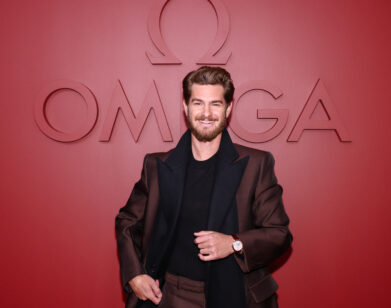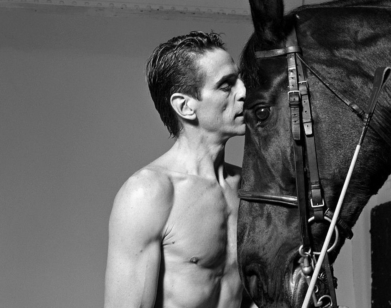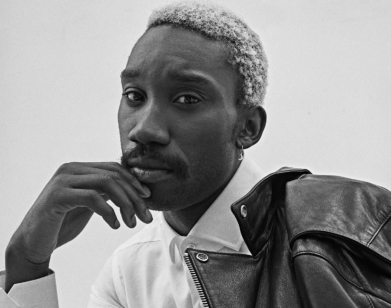film!
Nat Wolff and Andrew Garfield Discuss the Art of the Comeback
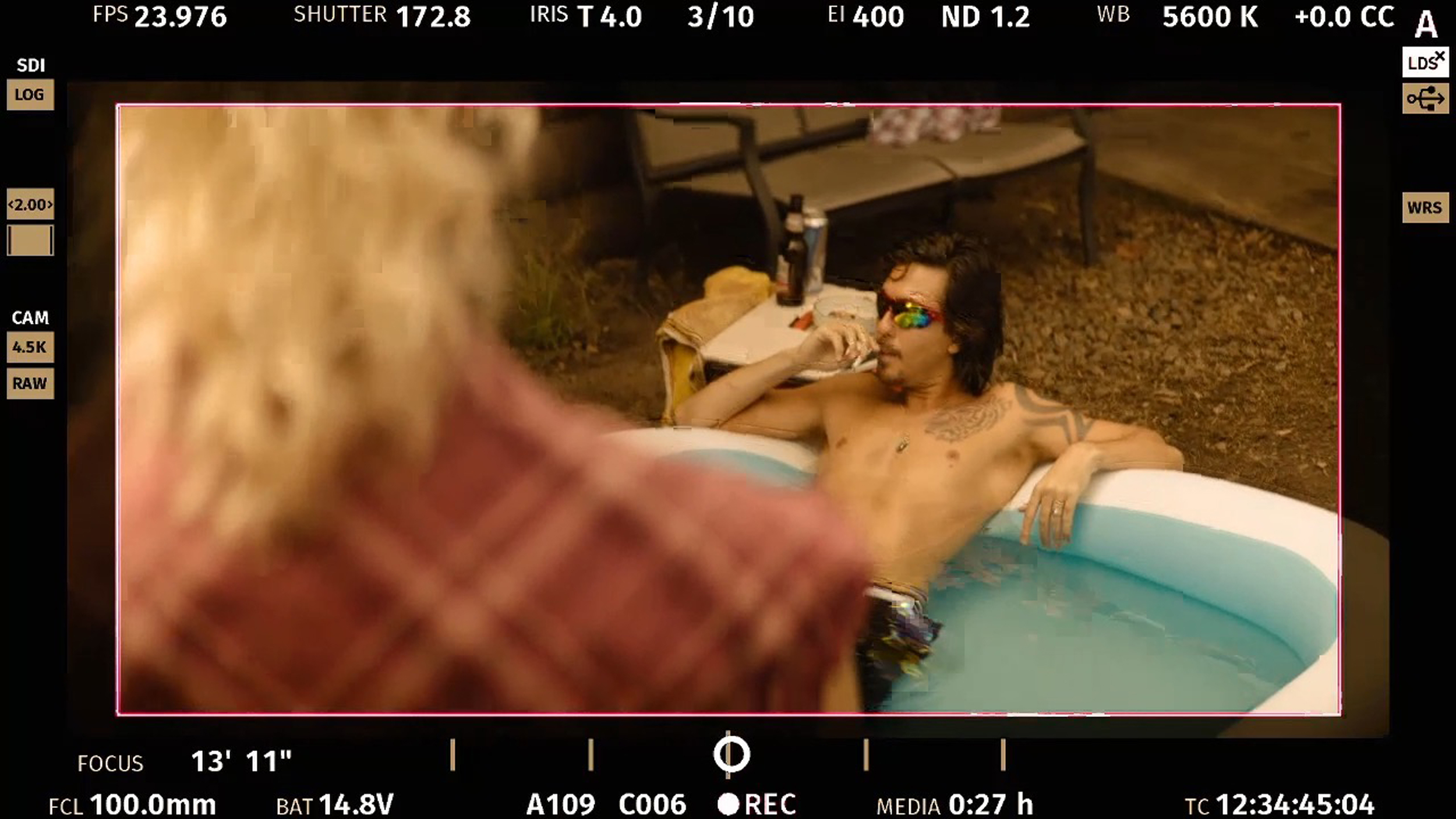
No show has managed to unify—and horrify— the culture quite as successfully as The Tiger King. Two years after the true-crime docuseries’ debut, America’s favorite felon and his feral cadre of exotic animal wranglers are making their return to the big screen in fictionalized form. In Joe vs Carole, Peacock’s dramatic spin on the jaw-dropping original, John Cameron Mitchell and Kate McKinnon face off as dueling big cat enthusiasts in the wilds of the Florida everglades. The show, which premiered earlier this month, features a tattoo-covered, mustachioed Nat Wolff as Travis Maldonado, Joe Exotic’s young, tortured lover. The role marks a departure—and a revival—for Wolff, who got his start as the star of Nickelodeon’s musical teen series The Naked Brothers Band. After years navigating the treacherous terrain of post-teen idol-dom, Wolff has finally found a way back into the spotlight on his own terms, and for this, he has mentors like Andrew Garfield to thank. Since their first collaboration on Gia Coppola’s 2020 indie dramedy Mainstream, the two actors have maintained a close friendship and fruitful creative partnership. Recently, Wolff and Garfield reunited for a conversation about love triangles, getting into character, and the prospect of a Mormon Joe Exotic mixtape. —LYLA TRILLING
———
NAT WOLFF: I love you so much, thank you for doing this, baby.
ANDREW GARFIELD: This is not a “thank you” kind of thing. I refuse to be thanked.
WOLFF: Andrew said I had to pay him $12,000 in cash. It’ll be showing up at your house in about an hour. You don’t need a thank you, you’ve got cash coming.
GARFIELD: I love you so much, and it’s a privilege for me to talk to you. You know how horrible it is when your friends or loved ones do a creative project and—
WOLFF: And you just hate it.
GARFIELD: Yeah. It’s middling or you’re struggling with it. I’m not in that situation often, but when I am, it’s so hard.
WOLFF: How about when you’re at a play and it’s really bad and you’re like, “Oh god.” You have to go backstage and say something, and you’re like, “Wow, you were really up there.”
GARFIELD: ”You really did that!”
WOLFF: ”You were really up on that stage, man.”
GARFIELD: ”That was crying. You cried.”
WOLFF: [Laughs] Okay, but finish your nice thought. I want to hear it.
GARFIELD: Yeah, I know you do. I wanted to say, “you really did that” on this show. [Laughs] No, just kidding.
WOLFF: [Laughs]
GARFIELD: Quite the contrary. You know what I think of you as a human being and as an actor. I’m inspired by you constantly. To see what you did as Travis in this show, you reach levels of universality and profundity of exposing and expressing the soul of the character and yourself simultaneously, which is going to be so healing to so many people, especially if they if they’ve known a Travis, or if they are a Travis themselves. It’s so beautiful. Your work throughout the series is so specific, unique, hilarious.
WOLFF: Man, I’m all choked up. This is the best $12,000 I’ve ever spent.
GARFIELD: [Laughs] There are two scenes in particular—one is your first heart-to-heart with John Cameron Mitchell, who plays Joe so brilliantly—where you see these two misfit toys fall in love properly. Like, trauma bond. It’s the most profoundly beautiful thing, you transported us as an audience. The second scene is the one where you’re trying to leave at the gate, you’re a caged bird. The different levels at play are just so—I don’t know, man, it’s a whole meal. It was so emotionally truthful. I’m genuinely so proud of you and that is no bullshit.
WOLFF: Thank you so much, Andrew. We met four years ago, and I have never been so inspired by somebody’s natural gift and insane work ethic. You work harder than any actor I’ve ever seen. I think of you as a brother and a hero, so hearing you say these things is really overwhelming for me. Yeah, those are the scenes that you sort of look forward to and dread. I did the scene at the gate the same day as the scene where I shoot myself and one where I’m in the pool. They would have Travis days, and I’d be like, “Wow, they’re really loaded me up.” There was this weird feeling on those days, where one of the actors would say to me, “Do you feel like there’s a weird spirit on set today?” And I’d say, “I think that’s Travis.” There was something about his pain that immediately I gravitated towards. Especially his downfall, because he starts off this lost puppy, and then he’s given a family and a purpose, and then the rug gets pulled out from under him. I found the documentary series really crushing, but I wanted to see more. I wanted to see what happened when the cameras weren’t rolling, because they were so clearly performing—Joe is such a performer. When I read this script, I was like, “Oh, this is exactly what I imagined.”
GARFIELD: I was watching with Greta, our shared acting guru, big sister, and matriarch of our chosen creative family. We know how lucky we are to have her in our lives, because we need mentors. You perfectly represented the beauty and the kind of toxicity of that relationship with John Cameron Mitchell, who is just so unbelievably specific and connected. It feels like there’s no acting happening between you two. And I’m proud to say that we prepped our characters that we were working on together.
WOLFF: You played Joe Exotic for me a bunch of times, you even had a great Joe Exotic voice. I played a bunch of Mormons for you. We’d switch back and forth.
GARFIELD: Yeah, I was prepping for Under the Banner of Heaven. It was a weird thing, the most straight-laced ’80s Mormon cult hanging out with Travis from Joe’s Wildlife.
WOLFF: Yeah, the mashup no one asked for.
GARFIELD: But everyone secretly needs. Someone will be making a TikTok very soon, featuring some homoerotic romance.
WOLFF: This is a really good idea.
GARFIELD: It writes itself. So, I saw how deeply you worked on this incredibly specific physicality. I could see you rewire your mind to reflect Travis’ rhythm. I also want to ask you about straddling—you’re so funny in the show as well. The way you kiss Joe and the way you kiss the other actor—
WOLFF: Sam Keeley, he’s incredible.
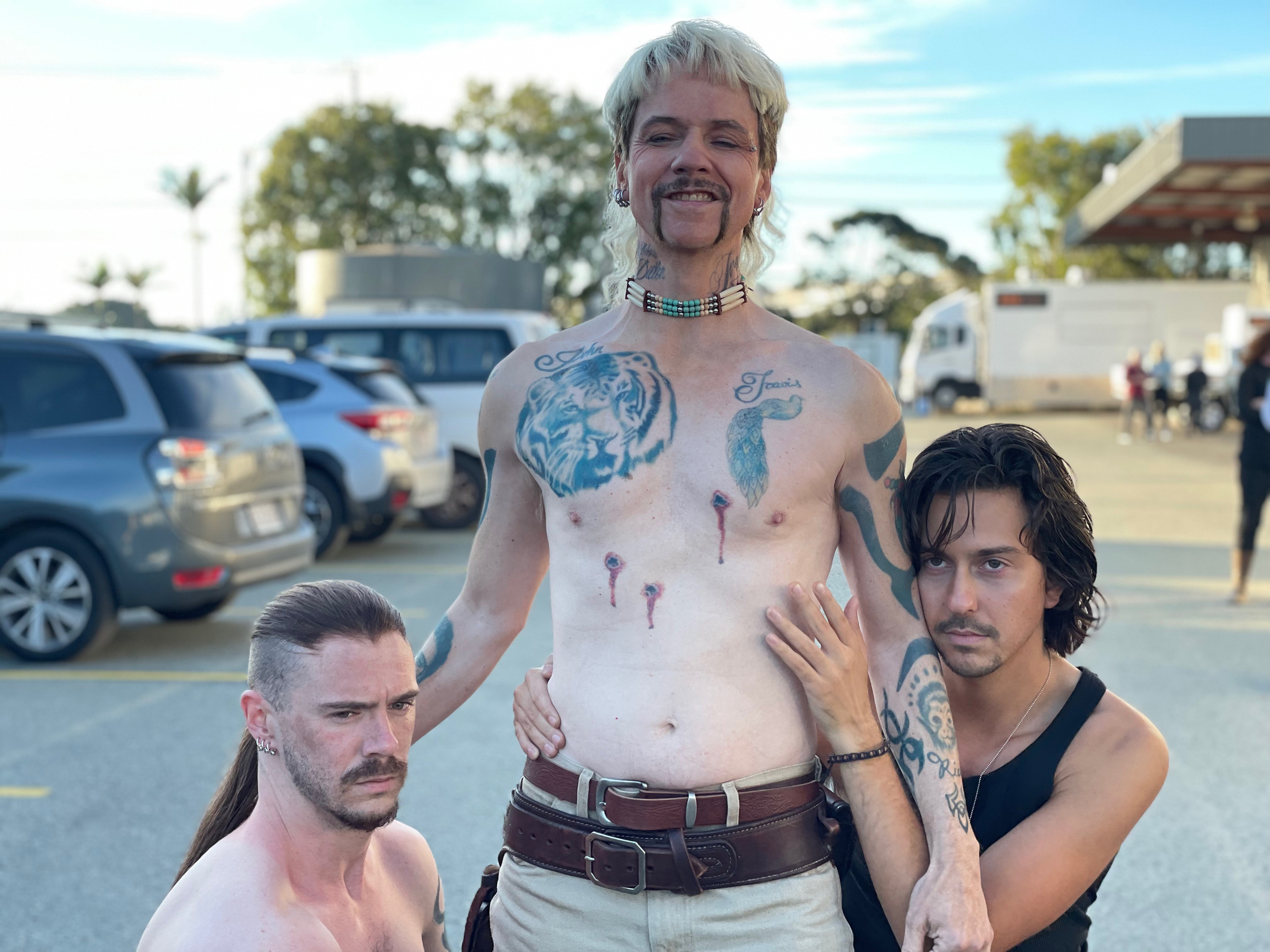
GARFIELD: He was so good as the other husband in that strange triangle.
WOLFF: One amazing moment of bonding that I had never had before was right before shooting. John Cameron Mitchell had a concert—he does these Hedwig and the Angry Inch concerts—and beforehand he asked me if I wanted to do one of Joe Exotic’s songs. I was like, “Fuck yes.” He wrote a song as Joe, and I sang with him as Travis. He brought his wig from hair and makeup, I took my Travis costume out, and we did this show together. This is about three days before shooting, during those days before where you’re not sleeping and you’re anxious. We were looking at each other on stage, and he was getting choked up during the performance, and it kind of made me get choked up. I was thinking, “Ok, we got this.” And then the kiss with Sam—he’s such a good actor.
GARFIELD: It’s so tragic. You can feel the love and the unspoken conversation between you and Sam’s character. Like, “What is it that we’re doing? Is this okay?”
WOLFF: There was real ridicule of them when the documentary series came out that was unfair. Travis and John didn’t even have a sexual relationship. They were really like Joe’s animals. He brought them in when they were wounded, he gave them the tools they needed to heal, and then he exploited them. I don’t think it started off that way, but Joe’s just a textbook narcissist. There’s this moment in the doc that was really telling for me, where Travis is angry at Joe for not letting him go see his sister, and he takes his shoulder and he bangs it against the meat truck really violently. It’s kind of terrifying. Then someone tells Travis on the walkie, “Joe’s coming in to see you,” and he gets this look of paralyzed fear in his eyes. You see Travis turn into a 12-year-old boy. When you talk about the gate scene, when Joe says to Travis, “Go out there, nobody’s going to care about you out there.” I don’t think he’s right. I mean, he was very charming and beautiful and, by all accounts, artistic. But he just had such low self-esteem that he responds to Joe, “You’re right, I’m just a loser.” And from there it’s all kover for him. So, doing the first couple of episodes was a blast because I got to be this really vulnerable character, but doing those last two episodes was pretty painful.
GARFIELD: Yeah, and you said they were Travis days where you had to flip between scenes and circumstances. Obviously, TV schedules can be rough, but how did you make sure you were as in pocket as possible for each one of those moments?
WOLFF: The cool thing about having a Travis day was that I just had to take care of myself enough to be really ready on that day. That meant I didn’t drink, I didn’t do anything to take away my energy. I think there’s a lot of talk about the acting process—tearing yourself apart in order to perform. What I’ve noticed from you is that you take in a lot—you read beautiful books and feeding yourself as opposed to just tearing yourself down. Greta, our lighthouse in the storm, was like, “You have to watch Brando in Fugitive Kind.” That was really helpful. So was Dirk Diggler in Boogie Nights and John Travolta in Saturday Night Fever and River Phoenix in My Own Private Idaho. I had like an 80 song playlist of songs that were really Travis-like, and then they let me take all the costumes home. That was another thing I remember you doing on Mainstream, you wore all the costumes. The insane thing was, at the start, I thought, “This character is so far removed from me.” As I got to know him, I realized how similar we were—especially in terms of insecurities and pains. I just found myself turning up certain dials and then turning down other ones.
GARFIELD: That’s the humbling thing about the way that you and I and Greta work—we find the character inside ourselves. Especially if we are with other great actors, we can show up on set and just be present after all that preparation. It’s so hard to do that on a TV set—to be that free, open, and courageous with the work, and to not have a preordained idea of what you’re going to do in the scene. But the work you’re doing is transcendent, and I think people are connecting to it because it’s so brave in that way. You’re really living as the character—not in that bastardized understanding of what it is to be a method actor now, where you have to be lifted out of yourself, which is a nonsense idea. It’s got nothing to do with method acting. You’re annoying because, you know I hate this about you, you’re this incredible musician. You come from such a creative family, and let’s not forget the legendary Naked Brothers Band. I know you guys are making music again—Oh, wow, I’m driving past a billboard with my face on it right now—just to talk about me for a second.
WOLFF: [Laughs] Does it say, “A dazzling, urgent Andrew Garfield performance?”
GARFIELD: [laughs] A DAZZLING one.
WOLFF: Finally, after waiting through 20 years of bullshit, a dazzling performance by Andrew Garfield.
GARFIELD: I have to say, finding friends in our business that we can sincerely support—its so rare. It’s so nice to cultivate that with other actors.
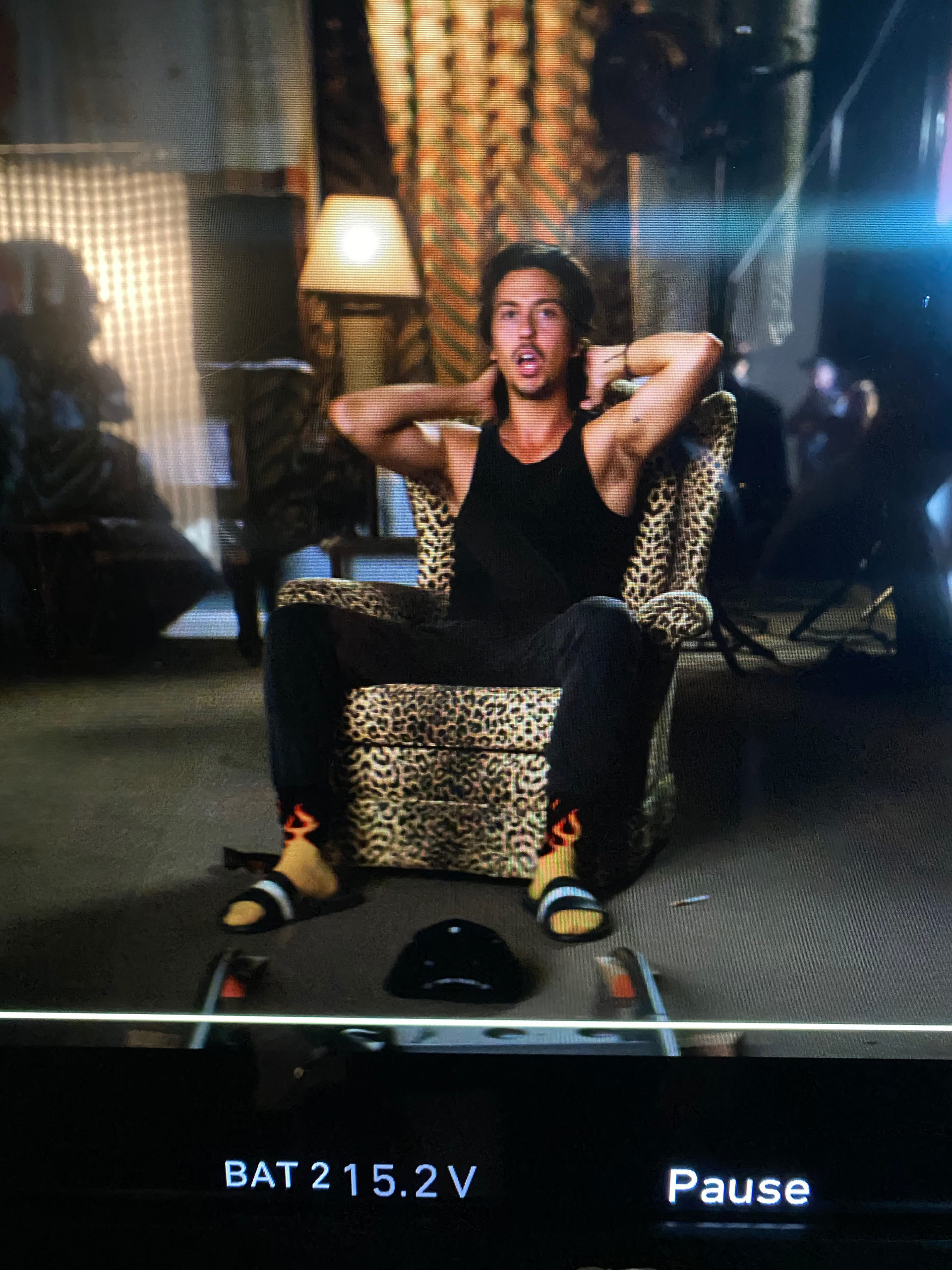
WOLFF: I’ve found it with so few people, and right now I’m watching you have this incredible year. Seeing that Tick, Tick, Boom premiere—not only was it a great movie, but everybody there was such a huge fan of Jonathan Larson’s music, and you could hear people singing along. I was sobbing at the end, so many people were, and sitting next to Greta. I felt pride the same way I do when my brother does something. I do consider you a brother.
GARFIELD: How is your brother?
WOLFF: Alex and I have new music coming out in September, and we’re going to tour for the first time. I miss playing live so much. About a year ago, Alex and I went to the studio for 11 days and knocked out like 15 songs—it was like having a Travis day. There was no time to overthink, which can be the death of creativity sometimes. I’m really excited to show you the whole record.
GARFIELD: I love the few songs I’ve heard. They go from profound, to sublime, to bangers. Just straight bangers. I’ve never said ‘straight bangers’ before.
WOLFF: Andrew Garfield: “Straight bangers.”
GARFIELD: Andrew Garfield on Nat Wolff: “He is a straight banger.” I don’t know if that makes sense.
WOLFF: Two straight bangers.
GARFIELD: Is there any overlap between how you approach the characters you play and the music you make? Is that a stupid question?
WOLFF: No, I love it. It’s better than the questions I used to get as an 11-year-old being interviewed by J-14 magazine. They’d be like, “Who is your celebrity crush? What prank did you pull on set?” Those are the questions that I grew up answering. I tend to write songs at 2:00 AM when the thinking part of my brain is turned off. The hard thing with acting is that you have to do it at 7:00 AM. I try to see these art forms like fingers on a fist. They come from the same base, but they’re different forms of expression.
GARFIELD: What do you want to do next?
WOLFF: When I was 20, I had this moment of playing young, nerdy heartthrob roles that were successful. I was going through a tough time with my dad being sick—obviously, you went through it with your mom, and we had that shared trauma. Luckily my dad’s still alive, but it was awful. I was really stupid in my career in my early 20s, I self-destructed a little bit, but now I’m finally getting a shot at some of the roles that I’ve always dreamed of playing, and I’m finally ready as a human and an actor to take it on. That has a lot to do with Greta, and with you. You move through this pretty toxic world in a very ethical way, and it’s very inspiring to me.
GARFIELD: You talk about self-destructing in your early 20s, but I should say—you are still a young whippersnapper. But there are certain modes that we have to take on as children in our families in order to survive. We have to exile parts of ourselves that aren’t as welcome at the table in order to support ourselves. If we’re lucky, those parts of us that were previously deemed unwelcome start to rumble to life as we age. It’s beautiful that you got to express the longing for freedom in Travis. But in your own life, you’re obviously someone who’s going to continually free yourself, not only as an actor, musician, and writer, but as a human being. It’s important to know that if people reject that, it’s got nothing to do with us. And actually, we will find the people that want to see us fully realized. You know you can count on me as that person.
WOLFF: I really feel that.
GARFIELD: It’s a beautiful thing, man.



